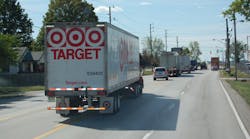Here’s an interesting thought: are goods imported into this country comprised of more “American made” components than we realize? And if that’s the case, does that translate into more freight volumes for U.S. trucking companies than we may realize?
Those are just two points I’m turning over in my head after leafing through a new report released this week by the National Retail Federation (NRF) entitled Rethinking Made in America in the 21st Century.“This report looks at retailers’ worldwide sourcing of merchandise not just as a global supply chain but as a global value chain,” noted Matthew Shay, NRF’s president and CEO, in a statement.
“It shows the value added at each step along the way, not just in manufacturing but from the initial concept to the finished product,” he pointed out. “Even in a product that says ‘Made in China,’ much of what goes into that product is ‘Made in America.’ That means millions of American jobs for American workers regardless of what the label might say.”
In a nutshell, Shay summed up the report this way: In a world of global supply chains, does ‘Made in America’ really mean what people think? “Unbeknownst to consumers, imported goods with foreign labels often include significant but unrevealed amounts of U.S. content,” he stressed.
So if that is the case, then a lot of that American-made “content” has to be first exported to overseas factories and assembly plants before returning as finished goods here – thus providing an unseen yet potentially healthy flow of freight for truckers to carry.
Handling that won’t be easy, by the way. Take a look at this interesting analysis of global supply chain trends from Frank Jones, vice president of the technology and manufacturing group at Intel Corp., from last year:
NRF noted for example in its study that apparel products contain more than 70% U.S. value on average, with some foreign-brand automobiles containing as much as 95% U.S. content even as no purportedly U.S.-made vehicle contains more than 75% U.S. content.
Then there’s the popular Apple iPod, which contains according to NRF’s report indicates some $162 in American content compared with $4 in Chinese content even though it is labeled “Made in China.”
Now, the group gets those percentages by including not only direct manufacturing costs such as materials, labor and overhead but non-manufacturing costs as well, such as research and development, product design, marketing and other services – elementals usually not considered even if all of those activities took place in the U.S. by U.S. workers.
Altogether, of the $1.85 billion in products imported in 2009, $464 million of the “value” came from American content – with 10 million U.S. jobs, or 11.2% of total U.S. employment, sustained by such “global” supply chain activity in 2008, according to the report’s data.
Now, this report is tied directly to one of NRF’s policy goals, namely the removal of both U.S. and foreign tariffs as well as the elimination of “non-tariff” barriers such as regulations that treat imported products differently from “American-made” goods – with the argument being that many imported goods are more American-made than some American-made goods.
For truckers, though, the question to be asked of NRF’s “import” analysis is how it translates into fostering more freight demand in this country – if it all.
Harry Moser, founder and president of the not-for-profit Reshoring Initiative, talked about the transportation costs for many goods often gets overlooked by businesses – something he touched on in a presentation a few years back:
Interesting perspectives to think about as global supply chains for all sorts of goods keep shifting.




